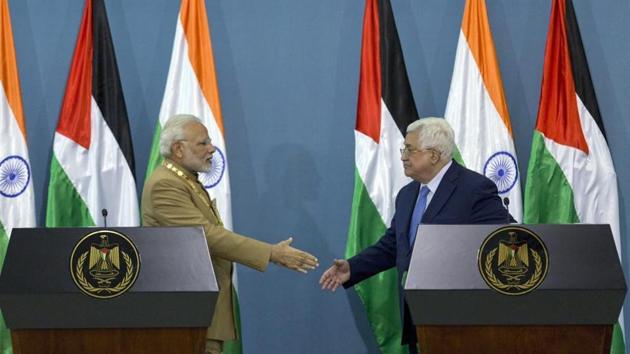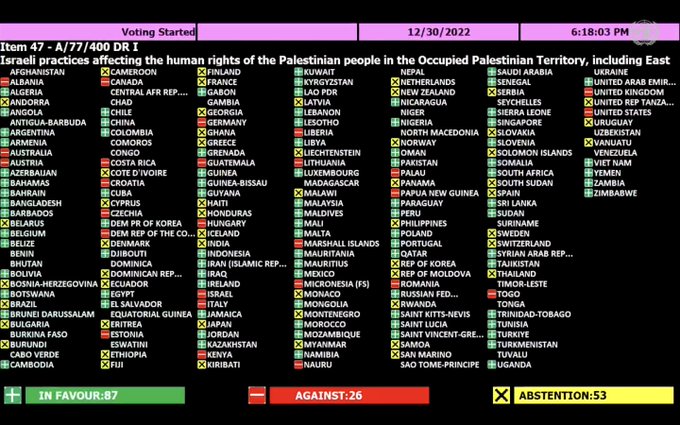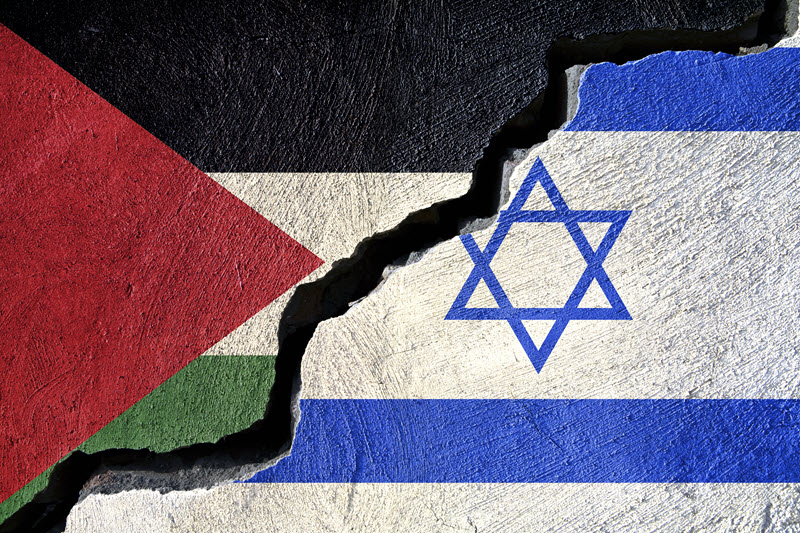In recent years, India has been reevaluating its stance on various global issues, and one such significant move is its decision to vote for Palestinian statehood. This move is a notable shift in India's foreign policy, as it marks a departure from its traditional stance on the Israeli-Palestinian conflict. The decision to support Palestinian statehood is a complex one, with various factors at play.
The implications of this move are far-reaching, with potential consequences for India's relationships with other countries, particularly in the Middle East. India's vote in favor of Palestinian statehood is seen as a significant development in international relations, as it reflects the country's growing assertiveness on the global stage. The decision is also likely to have an impact on India's relations with other nations, including the United States and Israel.
Some of the key aspects of India's decision to vote for Palestinian statehood include:
- India's historical support for the Palestinian cause, which dates back to the country's independence movement
- The growing importance of the Middle East in India's foreign policy, driven by factors such as energy security and trade
- The role of international organizations, such as the United Nations, in shaping India's stance on the Israeli-Palestinian conflict
- The potential consequences of India's decision for its relationships with other countries, including the United States, Israel, and the Arab nations
The decision to vote for Palestinian statehood is also reflective of India's evolving foreign policy priorities, which are driven by a range of factors, including economic interests, strategic considerations, and diplomatic relationships. As India continues to navigate the complexities of international relations, its stance on the Israeli-Palestinian conflict is likely to remain an important aspect of its foreign policy. The move is seen as a significant step forward in India's engagement with the global community, and its implications will be closely watched by policymakers and analysts around the world.

Introduction to Palestinian Statehood
The concept of Palestinian statehood refers to the idea of establishing an independent Palestinian nation, with its own government, economy, and international recognition. This concept has been a longstanding goal for the Palestinian people, who have been seeking self-determination and independence for decades. The history of Palestinian statehood dates back to the early 20th century, when the Palestinian Arab population was under British rule.
During the British Mandate period, the Palestinian Arab population began to demand independence and self-rule. However, the British government's decision to support the establishment of a Jewish homeland in Palestine led to the displacement of hundreds of thousands of Palestinians, known as the Nakba or "catastrophe" in Arabic. This event marked the beginning of the Palestinian refugee crisis, which continues to this day.
The significance of international recognition for Palestine cannot be overstated. International recognition is crucial for the establishment of a Palestinian state, as it would provide the necessary legitimacy and support for the Palestinian people's right to self-determination. Some of the key benefits of international recognition include:
- Legitimacy and recognition of Palestinian sovereignty
- Access to international institutions and organizations
- Eligibility for international aid and assistance
- Increased diplomatic pressure on Israel to negotiate a peaceful resolution
International recognition would also provide a significant boost to the Palestinian economy, which has been severely impacted by the Israeli occupation and blockade.
The international community has been gradually recognizing Palestine as a sovereign state, with over 140 countries having recognized Palestine as a non-member observer state at the United Nations. This recognition is a significant step towards the establishment of a Palestinian state, and it reflects the growing international consensus that the Palestinian people have the right to self-determination and independence.
In recent years, several countries have taken steps to recognize Palestine as a sovereign state, including Sweden, the United Kingdom, and France. These recognitions have been accompanied by increased diplomatic efforts to negotiate a peaceful resolution to the Israeli-Palestinian conflict. The international community's recognition of Palestine is a crucial step towards the establishment of a just and lasting peace in the region.

India's Stance on Palestine
India's relationship with Palestine dates back to the pre-independence era, with the country consistently supporting the Palestinian cause. This historical support can be attributed to India's own struggle for independence and its subsequent identification with other national liberation movements. The Indian National Congress, which played a significant role in India's freedom struggle, expressed solidarity with the Palestinian people as early as the 1930s.
The factors that led to India's decision to vote for Palestinian statehood are multifaceted. Some of the key factors include:
- Historical ties: India's historical support for the Palestinian cause, as mentioned earlier, has been a significant factor in shaping its stance on the issue.
- Anti-colonial and anti-imperialist stance: India's own experience with colonialism has made it naturally sympathetic to the Palestinian cause, which is seen as a struggle against Israeli occupation.
- Non-Alignment Movement: India's participation in the Non-Alignment Movement, which aimed to promote independence and self-determination for newly independent nations, has also influenced its stance on Palestine.
- International solidarity: India has been part of various international forums and organizations that have expressed support for the Palestinian cause, further solidifying its stance.
India's decision to vote in favor of Palestinian statehood at the United Nations in 2012 marked a significant milestone in its relationship with Palestine. This move was seen as a reaffirmation of India's commitment to the Palestinian cause and its support for a two-state solution. Since then, India has continued to express its support for Palestine, with the Indian government reiterating its stance on various occasions.
The Indian government's stance on Palestine has been consistent across different political regimes, with successive governments reaffirming their support for the Palestinian cause. This consistency can be attributed to the widespread support for Palestine among the Indian public, as well as the country's long-standing commitment to promoting peace and justice in the region. As the situation in the Middle East continues to evolve, India's stance on Palestine remains an important aspect of its foreign policy.

UN Declaration and International Support
The United Nations declaration on Palestinian statehood is a significant milestone in the Palestinian people's quest for self-determination and statehood. This declaration, which was adopted by the UN General Assembly in 2012, recognizes Palestine as a non-member observer state. The declaration is based on the 1967 borders, with Jerusalem as the capital of the Palestinian state.
The key points of the UN declaration include the recognition of Palestine as a sovereign state, the right of the Palestinian people to self-determination, and the need for a two-state solution to the Israeli-Palestinian conflict. The declaration also calls for an end to Israeli settlement activities in the occupied territories and for the resumption of negotiations between Israel and Palestine.
The UN declaration was backed by an overwhelming majority of nations, with 142 countries voting in favor of the resolution. Some of the notable countries that supported the declaration include:
- India, which has traditionally been a strong supporter of the Palestinian cause
- Most countries in Africa, Asia, and Latin America, which have historically been sympathetic to the Palestinian struggle for statehood
- Many countries in Europe, including France, Spain, and Ireland, which have been critical of Israeli settlement activities and have called for a two-state solution
- Several countries in the Middle East, including Egypt, Jordan, and Turkey, which have been involved in efforts to broker a peace agreement between Israel and Palestine
The international community's support for the UN declaration on Palestinian statehood reflects the widespread recognition of the Palestinian people's right to self-determination and statehood. The declaration has also been seen as a significant step towards a two-state solution to the Israeli-Palestinian conflict, which is widely regarded as the most viable way to achieve lasting peace in the region. India's support for the declaration, in particular, reflects its long-standing commitment to the Palestinian cause and its support for the rights of the Palestinian people.
The UN declaration has also been seen as a significant diplomatic victory for the Palestinian leadership, which has been seeking international recognition of Palestinian statehood for many years. The declaration has also been welcomed by many Palestinians, who see it as a major step towards the realization of their dream of an independent Palestinian state. Overall, the UN declaration on Palestinian statehood represents an important milestone in the Palestinian people's quest for self-determination and statehood, and reflects the international community's commitment to a two-state solution to the Israeli-Palestinian conflict.

Implications and Future Prospects
India's vote on the Israeli-Palestinian conflict has significant implications for its relations with other countries. The country's stance on this issue can either strengthen or strain its ties with nations that have opposing views. For instance, India's vote can impact its relations with the US, a long-time ally of Israel. The US may view India's vote as a departure from its traditional stance on the issue, potentially leading to a re-evaluation of their bilateral relations.
The implications of India's vote can also be seen in its relations with Israel. Israel has been a key partner for India in terms of defense and technology cooperation. However, if India's vote is perceived as being against Israeli interests, it may lead to a cooling of relations between the two nations. On the other hand, India's vote can also be seen as an opportunity to strengthen its relations with Arab countries, which have traditionally been supportive of the Palestinian cause.
Some of the key implications of India's vote on its relations with other countries include:
- Re-evaluation of India's relations with the US, with potential implications for bilateral trade and defense cooperation
- Possible strain on India's relations with Israel, which could impact defense and technology cooperation
- Opportunities for India to strengthen its relations with Arab countries, which could lead to increased economic cooperation and diplomatic engagement
- Potential impact on India's role in regional and international organizations, such as the United Nations and the Non-Aligned Movement
The future prospects of the Israeli-Palestinian conflict are uncertain and depend on various factors, including the actions of key players such as the US, Israel, and the Palestinian Authority. However, some potential future developments in the conflict include a renewed push for a two-state solution, increased diplomatic efforts by the international community, and a growing role for regional players such as India and other Arab countries.
In terms of future developments, the Israeli-Palestinian conflict is likely to remain a contentious issue, with both sides dug in and unwilling to compromise. However, with increased diplomatic efforts and international pressure, there may be opportunities for a breakthrough in the peace process. India's vote on the issue can be seen as a call for a more nuanced and balanced approach to the conflict, one that takes into account the concerns and aspirations of both Israelis and Palestinians.

Frequently Asked Questions (FAQ)
Why did India vote for Palestinian statehood?
India's decision to vote in favor of Palestinian statehood is rooted in its long-standing support for the Palestinian cause. This stance is a reflection of the country's commitment to upholding the principles of international law and justice. India has consistently advocated for the rights of the Palestinian people and has been a vocal supporter of their struggle for self-determination.
Historically, India has maintained good relations with the Arab world, and its support for the Palestinian cause is an extension of this friendship. India's vote in favor of Palestinian statehood is also driven by its desire to promote peace and stability in the region. By recognizing Palestine as a sovereign state, India hopes to contribute to the creation of a more just and equitable Middle East.
Some of the key factors that influenced India's decision to vote for Palestinian statehood include:
- India's commitment to the principles of international law, including the right to self-determination and the protection of human rights
- Its historical ties with the Arab world and its desire to strengthen these relations
- Its support for the Palestinian people's struggle for independence and statehood
- Its commitment to promoting peace and stability in the Middle East
India's vote in favor of Palestinian statehood is also a reflection of its growing role in global affairs. As a major emerging power, India is increasingly taking a more proactive stance on international issues, including the Israeli-Palestinian conflict. By voting in favor of Palestinian statehood, India is demonstrating its commitment to multilateralism and its desire to work with other countries to promote peace and justice around the world.
In conclusion, India's decision to vote for Palestinian statehood is a testament to its enduring commitment to the principles of international law and justice. By recognizing Palestine as a sovereign state, India is promoting a more just and equitable Middle East, and is contributing to the creation of a more peaceful and stable world. This decision is also a reflection of India's growing influence on the global stage, and its desire to play a more active role in promoting peace and justice around the world.
How will India's vote affect its relations with Israel?
India's decision to vote in favor of Palestinian statehood has sparked a significant debate about its potential impact on the country's relations with Israel. Historically, India and Israel have enjoyed a robust and multifaceted relationship, with bilateral trade and diplomatic ties experiencing significant growth over the years. However, India's vote may lead to a re-evaluation of this relationship, with potential consequences for trade and diplomacy.
The implications of India's vote are far-reaching, and several factors are likely to influence the future of India-Israel relations. Some of the key considerations include:
- India's long-standing support for the Palestinian cause, which may be seen as inconsistent with its growing ties with Israel
- The potential for Israel to re-assess its diplomatic engagement with India, potentially leading to a cooling of relations
- The impact on bilateral trade, which has been a significant aspect of the India-Israel relationship, with trade volumes exceeding $5 billion annually
The re-evaluation of India-Israel relations may also be influenced by regional and global factors, including the geopolitical dynamics of the Middle East and the role of other major powers. India's vote may be seen as an attempt to balance its relationships with different countries and regions, while also promoting its own national interests. As the situation continues to evolve, it is likely that India will need to navigate a complex web of diplomatic relationships, balancing its ties with Israel with its support for the Palestinian cause.
In terms of diplomatic ties, India's vote may lead to a period of introspection and re-assessment, potentially resulting in a shift in the tone and tenor of the relationship. This could manifest in a range of ways, including changes to the frequency and nature of high-level visits, the scope of joint diplomatic initiatives, and the overall level of engagement between the two countries. As India seeks to promote its own national interests while also navigating the complexities of the Middle East, its relations with Israel are likely to remain a key aspect of its foreign policy calculus.
The potential consequences for bilateral trade are also significant, with India's vote potentially leading to a reduction in trade volumes or a shift in the composition of trade between the two countries. India and Israel have cooperated closely on a range of trade-related issues, including agriculture, technology, and defense, and any disruption to these ties could have far-reaching implications for both countries. As the situation continues to unfold, it is likely that trade will remain a key aspect of the India-Israel relationship, with both countries seeking to promote their own economic interests while also navigating the complexities of the diplomatic relationship.
What are the next steps for the Palestinian statehood movement?
The Palestinian statehood movement has been a longstanding effort to establish a sovereign Palestinian state. This movement has gained significant international attention and support over the years. The next steps for the movement involve a multi-faceted approach to achieve statehood.
One of the key aspects of this approach is continued international diplomacy and advocacy. This includes engaging with international organizations, governments, and civil society to raise awareness about the Palestinian cause and build support for statehood. The Palestinian leadership has been actively involved in diplomatic efforts, including negotiations with Israel and engagement with the international community.
Some of the potential strategies for advancing the Palestinian statehood movement include:
- Building alliances with like-minded countries and organizations to increase diplomatic pressure on Israel
- Engaging in international advocacy campaigns to raise awareness about the Palestinian cause
- Pursuing legal avenues, such as the International Criminal Court, to hold Israel accountable for its actions
In addition to international diplomacy and advocacy, potential negotiations with Israel are also a crucial step towards establishing a sovereign Palestinian state. These negotiations would need to address key issues such as borders, security, and the status of Jerusalem. The Palestinian leadership has expressed a willingness to engage in negotiations, but these efforts have been hindered by Israeli settlement expansion and other obstacles.
The ultimate goal of the Palestinian statehood movement is to establish a sovereign and independent Palestinian state, based on the 1967 borders, with East Jerusalem as its capital. Achieving this goal will require sustained international pressure, diplomatic efforts, and a commitment to negotiations. The movement's success will depend on its ability to build and maintain international support, while also navigating the complexities of negotiations with Israel.





